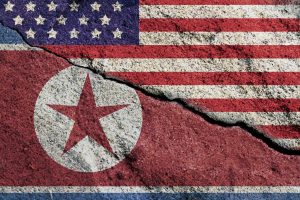Over the past few months, North Korea has carried out an unprecedented blitz of missile launches, artillery exercises, and massive air maneuvers. This crescendo of fire reached a fever pitch in response to large-scale joint air exercises conducted between Seoul and Washington. Amid these tensions, the United States has reiterated its unwavering commitment to respond forcefully to any use of nuclear weapons by North Korea.
Despite the frequency and intensity of North Korean provocations, fewer Americans are paying attention to the country. A November 2022 Chicago Council poll painted a picture of a uninterested public. Fewer Americans identified North Korea as a critical threat, half of Americans believed that the United States should learn to live with a nuclear North Korea, and 77 percent believed that the United States should focus on its problems at home instead.
A soon-to-be released KEI-YouGov study conducted in September 2022 echoes this lackluster – and increasingly waning – U.S. public interest in North Korea. In 2021, 38 percent of respondents who followed Asia-Pacific news viewed North Korea as the most critical foreign policy challenge to the United States; in 2022, the figure fell to 23 percent and was overtaken by 40 percent who saw Iran as a more significant threat.
Interestingly, the unfavorable figures for North Korea showed a statistically significant drop across the board from 2021 to 2022. These figures may reflect the influence of the many geopolitical threats that Americans must contend with. The dwindling interest – despite Pyongyang’s groundbreaking announcement of a codified nuclear doctrine during the survey period – nevertheless suggests a level of public fatigue after decades of repetitive cycles of escalation and de-escalation with North Korea.
While respondents continued to believe that cooperation with South Korea is in the U.S. national interest, North Korea has fallen in the list of priorities. A greater number of respondents in 2022 believed that the United States should increase its troop presence in South Korea. Four in 10 Americans believed the United States should maintain U.S. service members in South Korea even on the basis of an agreement with North Korea to give up its nuclear weapons, with the number of those believing that the troop presence should be increased in the same scenario doubling from 2021. But the unifying variable throughout is that the most important U.S. national interest in East Asia is countering the rise of China. The defense of U.S. friends and allies falls to a sizable yet still distant second.
Put cynically, there is a lack of political incentive for U.S. policymakers to take bold action on North Korea, which often comes with timetables that far outlast electoral terms, and may require compromises. Policymakers have learned that political capital has been empirically far better spent elsewhere than striking deals with North Korea. Given the current levels of public interest, the unfortunate reality is that this approach is unlikely to change anytime soon.
Attempting to overcome the traditional cycle of escalation and crisis management with Pyongyang has long been a prolific source of political friction within the United States. Congressional barriers to funding the Korean Peninsula Energy Development Organization (KEDO) were instrumental in the breakdown of the 1994 Geneva Accord. The Trump administration’s unconventional, unilateral summit diplomacy approach turned out to be but a surface-deep show, more focused on spectacle than achieving tangible breakthroughs. Today, the Biden administration faces criticism for slow movement on appointing a North Korean human rights ambassador, blaming a “laborious” vetting process that would save the administration precious political capital.
As we once again confront the prospects of armed conflict with Pyongyang, it is clear that Washington – both Congress and the executive branch – doesn’t have much space to improve its North Korea policy and avoid perpetrating this cycle. A proactive policy beyond deterrence and economic containment on North Korea will need a longer time horizon, significantly greater willingness to spend political capital to depart from the status quo, and greater bipartisan consensus on any new initiatives. That alone is a lot to ask in a normal year. In this economy and in this political climate, such a challenge could not be further from the priority for the voting public and its elected representatives.
It would be foolhardy to place the blame for this perpetual cycle of escalation and de-escalation solely on jaded U.S. policy. We cannot possibly expect Washington to direct all of its efforts toward North Korea as the number one issue for the United States, ignoring other pressing issues such as the climate catastrophe, Russian aggression and Chinese competition, vulnerable supply chains and weakened markets, and domestic political polarization – to name just a few. And even if North Korea were to become priority number one for Washington overnight, Pyongyang has time and again proven its ability to respond in bad faith. Nonetheless, we cannot begin to realistically expect top-ticket breakthroughs on North Korea with backburner input.
So, the United States and North Korea are back on the escalation merry-go-round, just as they were in 2017. In 2018, we managed to back down from the brink. But it is dangerous to assume that one side will always back down, and we will simply continue managing the escalation game. For the longer we play this game, our likelihood to somehow “win” does not become any greater – but the likelihood of one side making a mistake does. And in what has now become a game of nuclear brinkmanship, the consequences of complacency could not be more dire.

































